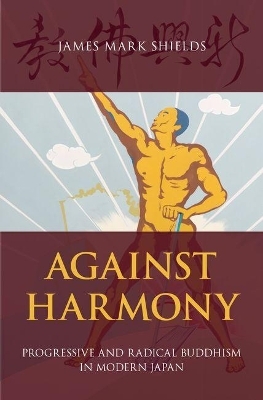
Against Harmony
Progressive and Radical Buddhism in Modern Japan
Seiten
2017
Oxford University Press Inc (Verlag)
978-0-19-066400-8 (ISBN)
Oxford University Press Inc (Verlag)
978-0-19-066400-8 (ISBN)
Against Harmony traces the history of progressive and radical experiments in Japanese Buddhist thought and practice from the mid-Meiji period (ca. 1885) through the early Showa period (ca. 1935).
Against Harmony traces the history of progressive and radical experiments in Japanese Buddhist thought practice from the mid-Meiji period through the early Showa period. Perhaps the two best representations of progressive Buddhism during this time were the New Buddhist Fellowship (1899-1915) and the Youth League for Revitalizing Buddhism (1931-1936), both non-sectarian, lay movements well-versed in both classical Buddhist texts and Western philosophy and religion. Their work effectively collapsed commonly held distinctions between religion, philosophy, ethics, politics, and economics. Unlike many others of their day, they did not regard the novel forces of modernization as problematic and disruptive, but as opportunities.
James Mark Shields examines the intellectual genealogy and alternative visions of progressive and radical Buddhism in the decades leading up to the Pacific War. Exposing the variety in the conceptions and manifestations of progress, reform, and modernity in this period, he outlines their important implications for postwar and contemporary Buddhism in Japan and elsewhere.
Against Harmony traces the history of progressive and radical experiments in Japanese Buddhist thought practice from the mid-Meiji period through the early Showa period. Perhaps the two best representations of progressive Buddhism during this time were the New Buddhist Fellowship (1899-1915) and the Youth League for Revitalizing Buddhism (1931-1936), both non-sectarian, lay movements well-versed in both classical Buddhist texts and Western philosophy and religion. Their work effectively collapsed commonly held distinctions between religion, philosophy, ethics, politics, and economics. Unlike many others of their day, they did not regard the novel forces of modernization as problematic and disruptive, but as opportunities.
James Mark Shields examines the intellectual genealogy and alternative visions of progressive and radical Buddhism in the decades leading up to the Pacific War. Exposing the variety in the conceptions and manifestations of progress, reform, and modernity in this period, he outlines their important implications for postwar and contemporary Buddhism in Japan and elsewhere.
James Mark Shields is Associate Professor of Comparative Humanities and Asian Thought at Bucknell University.
Introduction
Prelude
1 The Many Faces of Meiji Buddhist Enlightenment
2 Unification and Spiritual Activism: Murakami and Manshi
3 Warp & Woof: The New Buddhist Discovery of Society
4 Zen & the Art of Treason: Renegade Priests of Late Meiji
5 Anarcho-Buddhist Utopia: Taisho Tolstoyans
6 Extremes Meet: Radical Buddhists of Early Showa
Conclusion
Appendices
Bibliography
Index
| Erscheinungsdatum | 29.04.2017 |
|---|---|
| Verlagsort | New York |
| Sprache | englisch |
| Maße | 236 x 157 mm |
| Gewicht | 680 g |
| Themenwelt | Geisteswissenschaften ► Geschichte ► Regional- / Ländergeschichte |
| Geschichte ► Teilgebiete der Geschichte ► Religionsgeschichte | |
| Geisteswissenschaften ► Religion / Theologie ► Buddhismus | |
| ISBN-10 | 0-19-066400-2 / 0190664002 |
| ISBN-13 | 978-0-19-066400-8 / 9780190664008 |
| Zustand | Neuware |
| Haben Sie eine Frage zum Produkt? |
Mehr entdecken
aus dem Bereich
aus dem Bereich
Herkunft, Blüte, Weg nach Osten
Buch | Hardcover (2024)
C.H.Beck (Verlag)
39,00 €
Von den Anfängen bis zur Gegenwart
Buch | Hardcover (2022)
C.H.Beck (Verlag)
34,00 €
warum die Religionen erst im Mittelalter entstanden sind
Buch | Hardcover (2024)
C.H.Beck (Verlag)
38,00 €


